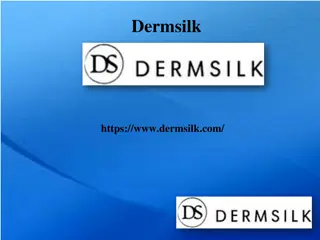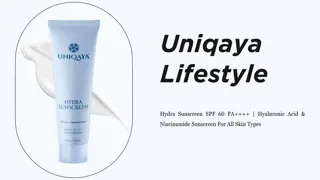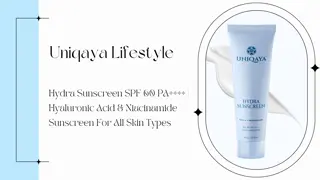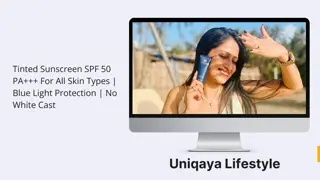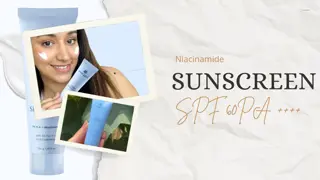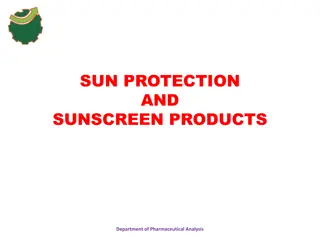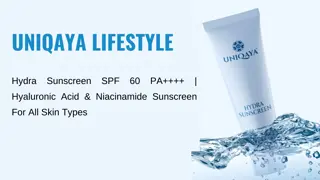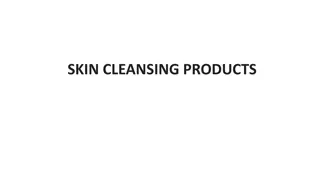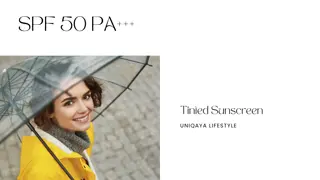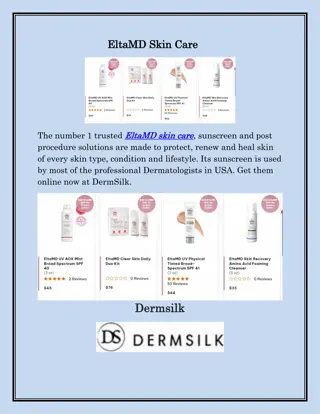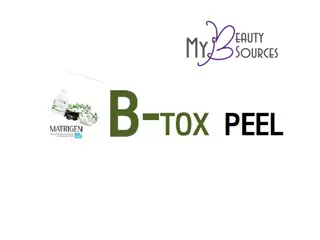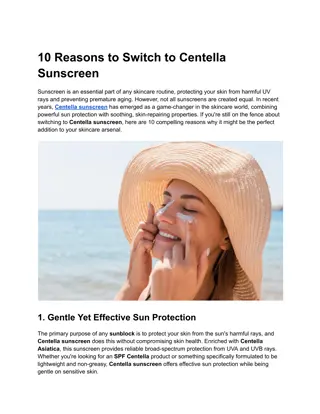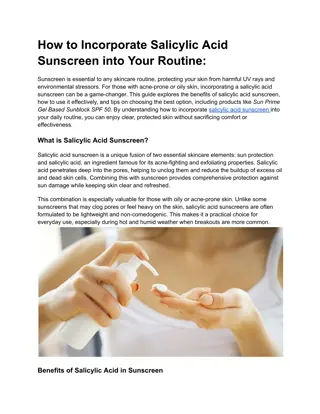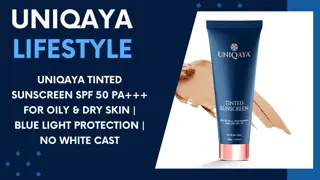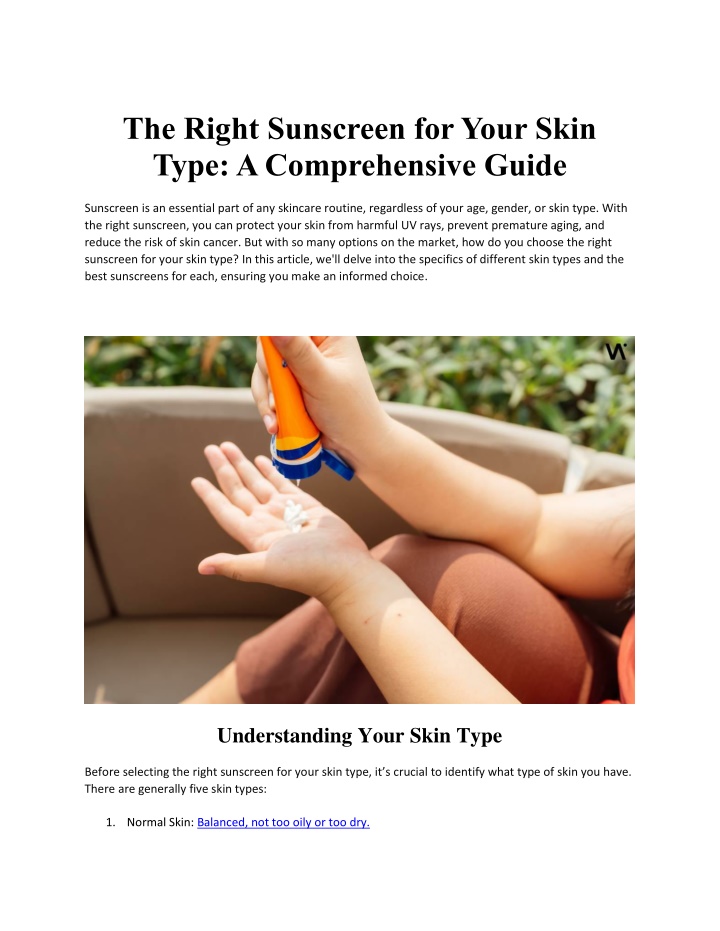
The Right Sunscreen for Your Skin Type A Comprehensive Guide
Sunscreen is an essential part of any skincare routine, regardless of your age, gender, or skin type. With the right sunscreen, you can protect your skin from harmful UV rays, prevent premature aging, and reduce the risk of skin cancer. But with so m
Download Presentation

Please find below an Image/Link to download the presentation.
The content on the website is provided AS IS for your information and personal use only. It may not be sold, licensed, or shared on other websites without obtaining consent from the author. If you encounter any issues during the download, it is possible that the publisher has removed the file from their server.
You are allowed to download the files provided on this website for personal or commercial use, subject to the condition that they are used lawfully. All files are the property of their respective owners.
The content on the website is provided AS IS for your information and personal use only. It may not be sold, licensed, or shared on other websites without obtaining consent from the author.
E N D
Presentation Transcript
The Right Sunscreen for Your Skin Type: A Comprehensive Guide Sunscreen is an essential part of any skincare routine, regardless of your age, gender, or skin type. With the right sunscreen, you can protect your skin from harmful UV rays, prevent premature aging, and reduce the risk of skin cancer. But with so many options on the market, how do you choose the right sunscreen for your skin type? In this article, we'll delve into the specifics of different skin types and the best sunscreens for each, ensuring you make an informed choice. Understanding Your Skin Type Before selecting the right sunscreen for your skin type, it s crucial to identify what type of skin you have. There are generally five skin types: 1.Normal Skin: Balanced, not too oily or too dry.
2.Oily Skin: Characterized by excess sebum production, leading to a shiny appearance and larger pores. 3.Dry Skin: Lacks moisture, leading to flaky, rough, and sometimes itchy patches. 4.Combination Skin: Features both oily and dry areas, typically oily in the T-zone (forehead, nose, and chin) and dry elsewhere. 5.Sensitive Skin: Prone to redness, irritation, and reactions to products and environmental factors. Knowing your skin type helps you choose products that cater to your specific needs, enhancing their effectiveness and minimizing potential side effects. Why Sunscreen Is Non-Negotiable Before diving into the specifics of choosing the right sunscreen for your skin type, it s important to understand why sunscreen is non-negotiable. UV radiation from the sun can cause significant damage to your skin. Here are some key reasons why sunscreen should be a staple in your daily skincare routine: Protection from UV Rays: Sunscreen protects your skin from the harmful effects of UVA and UVB rays. UVA rays penetrate deep into the skin, causing aging and wrinkles, while UVB rays cause sunburn. Preventing Skin Cancer: Regular use of sunscreen reduces the risk of developing skin cancers, including melanoma, which can be life-threatening. Preventing Premature Aging: Sunscreen helps in preventing premature signs of aging like fine lines, wrinkles, and hyperpigmentation caused by sun exposure. Even Skin Tone: It prevents discoloration and dark spots resulting from sun damage, keeping your complexion even. Now that we understand the importance of sunscreen, let s explore how to choose the right sunscreen for your skin type. The Right Sunscreen for Normal Skin Characteristics of Normal Skin Normal skin is well-balanced, with even sebum production and good blood circulation. It s neither too oily nor too dry and tends to have a smooth texture with minimal imperfections. Recommended Sunscreen Types for Normal Skin For normal skin, the options are quite versatile. You can choose from chemical, physical, or hybrid sunscreens. Here are some recommended options: 1.Chemical Sunscreens: These contain organic (carbon-based) compounds that absorb UV radiation and convert it into heat, which is then released from the skin. They are often lightweight and blend seamlessly into the skin.
2.Physical Sunscreens: Also known as mineral sunscreens, these contain active mineral ingredients like zinc oxide or titanium dioxide that sit on top of the skin and reflect UV rays. They are typically less likely to cause irritation. 3.Hybrid Sunscreens: These combine both chemical and physical blockers, offering broad- spectrum protection with a balanced texture and feel. Product Recommendations La Roche-Posay Anthelios Melt-in Milk Sunscreen SPF 100: Offers broad-spectrum protection with a lightweight, non-greasy formula. Neutrogena Ultra Sheer Dry-Touch Sunscreen SPF 100: Known for its lightweight feel and matte finish. EltaMD UV Clear Broad-Spectrum SPF 46: Combines the benefits of chemical and physical sunscreens, suitable for those prone to occasional breakouts. The Right Sunscreen for Oily Skin Characteristics of Oily Skin Oily skin produces excess sebum, leading to a shiny complexion and enlarged pores. This skin type is prone to acne and breakouts.
Recommended Sunscreen Types for Oily Skin For oily skin, it s important to choose a sunscreen that doesn t exacerbate oiliness or clog pores. Look for: 1.Oil-Free Formulas: These sunscreens are specifically designed to control shine and prevent clogged pores. 2.Gel-Based Sunscreens: Lightweight and absorb quickly into the skin without leaving a greasy residue. 3.Matte Finish Sunscreens: Help control excess oil and provide a shine-free finish. Product Recommendations La Roche-Posay Anthelios Clear Skin Dry Touch Sunscreen SPF 60: Oil-free, non-comedogenic formula ideal for oily skin. Neutrogena Hydro Boost Water Gel Lotion Sunscreen SPF 30: Lightweight, water-gel formula that hydrates without adding shine. EltaMD UV Clear Broad-Spectrum SPF 46: Contains niacinamide, which helps reduce oil and prevent breakouts. The Right Sunscreen for Dry Skin Characteristics of Dry Skin Dry skin lacks moisture, leading to a tight, flaky, and sometimes rough texture. This skin type requires extra hydration. Recommended Sunscreen Types for Dry Skin For dry skin, choose sunscreens that provide hydration and don t strip away natural oils. Look for: 1.Moisturizing Sunscreens: Contain hydrating ingredients like hyaluronic acid, glycerin, and ceramides. 2.Cream-Based Formulas: Thicker consistency that helps lock in moisture. 3.Physical Sunscreens: Tend to be more moisturizing and less likely to irritate dry skin. Product Recommendations Aveeno Positively Radiant Daily Moisturizer SPF 30: Contains soy complex to hydrate and improve skin texture. CeraVe Hydrating Sunscreen SPF 50: Contains ceramides and hyaluronic acid to provide long- lasting hydration. Neutrogena Hydro Boost Gel-Cream Sunscreen SPF 30: Combines sun protection with intense hydration. The Right Sunscreen for Combination Skin
Characteristics of Combination Skin Combination skin has both oily and dry areas. Typically, the T-zone (forehead, nose, and chin) is oily, while the cheeks are dry. Recommended Sunscreen Types for Combination Skin For combination skin, you need a balanced approach that addresses both oily and dry areas. Look for: 1.Lightweight Formulas: Don t clog pores in the oily areas but provide enough moisture for the dry areas. 2.Gel-Cream Textures: Offer a balance of hydration and non-greasy feel. 3.Non-Comedogenic: Ensures the product won t clog pores, preventing breakouts in the oily areas. Product Recommendations Clinique Super City Block Oil-Free Daily Face Protector SPF 40: Lightweight, non-comedogenic, and suitable for all skin types. Neutrogena Ultra Sheer Dry-Touch Sunscreen SPF 55: Provides a matte finish without drying out the skin. EltaMD UV Daily Broad-Spectrum SPF 40: Lightweight, moisturizing formula that works well for combination skin. The Right Sunscreen for Sensitive Skin Characteristics of Sensitive Skin Sensitive skin is easily irritated and can react to various ingredients and environmental factors. It often exhibits redness, itching, and discomfort. Recommended Sunscreen Types for Sensitive Skin For sensitive skin, it s important to choose sunscreens that are gentle, hypoallergenic, and free from harsh chemicals. Look for: 1.Physical Sunscreens: Contain zinc oxide or titanium dioxide, which are less likely to cause irritation. 2.Fragrance-Free: Avoid added fragrances that can trigger reactions. 3.Hypoallergenic: Specifically formulated to minimize the risk of allergies and irritation. Product Recommendations Blue Lizard Sensitive Mineral Sunscreen SPF 30+: Contains zinc oxide and titanium dioxide, and is free from fragrances and parabens. Aveeno Sensitive Skin Mineral Sunscreen SPF 50: Formulated with soothing oat extract, providing broad-spectrum protection without irritation. EltaMD UV Pure Broad-Spectrum SPF 47: Gentle, physical sunscreen ideal for sensitive skin. Application Tips for Optimal Protection
Choosing the right sunscreen for your skin type is only half the battle. Proper application is crucial to ensure you get the full benefits of sun protection. Here are some tips for applying sunscreen effectively: 1.Apply Generously: Most people apply too little sunscreen. Use at least one ounce (about a shot glass full) to cover your entire body. 2.Apply Evenly: Make sure to spread the sunscreen evenly across all exposed areas, including the back of your neck, ears, and tops of your feet. 3.Reapply Regularly: Sunscreen wears off, especially after swimming, sweating, or toweling off. Reapply every two hours, or more frequently if needed. 4.Use Sunscreen Year-Round: UV rays can damage your skin even on cloudy days and during the winter. Make sunscreen a daily habit. 5.Don t Forget Your Lips: Use a lip balm with SPF to protect your lips from sun damage. 6.Layer It Right: If you re using other skincare products, apply sunscreen as the last step before makeup. Allow it to absorb fully before applying foundation or other cosmetics. Conclusion: Making Sunscreen a Daily Habit Finding the right sunscreen for your skin type is essential for maintaining healthy, protected skin. Whether you have normal, oily, dry, combination, or sensitive skin, there is a sunscreen out there that will meet your needs. By understanding your skin type and selecting the appropriate sunscreen, you can ensure that your skin is well-protected against the harmful effects of UV radiation.
Remember, sunscreen is a critical part of your daily skincare routine, not just an optional extra. Regular use of sunscreen can help prevent skin cancer, premature aging, and other forms of sun damage. So, make it a habit to apply sunscreen every day, rain or shine, and enjoy the benefits of healthy, protected skin for years to come. With the right sunscreen for your skin type, you can confidently step out into the sun, knowing that you re taking the best possible care of your skin. Invest in a quality sunscreen, follow proper application techniques, and embrace the outdoors with peace of mind.





